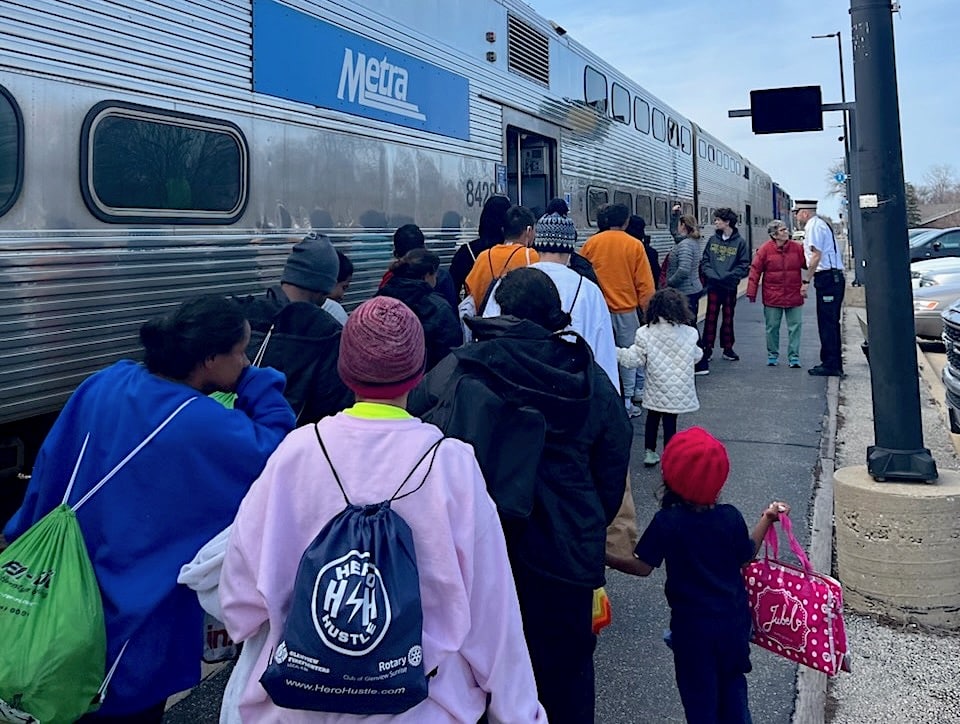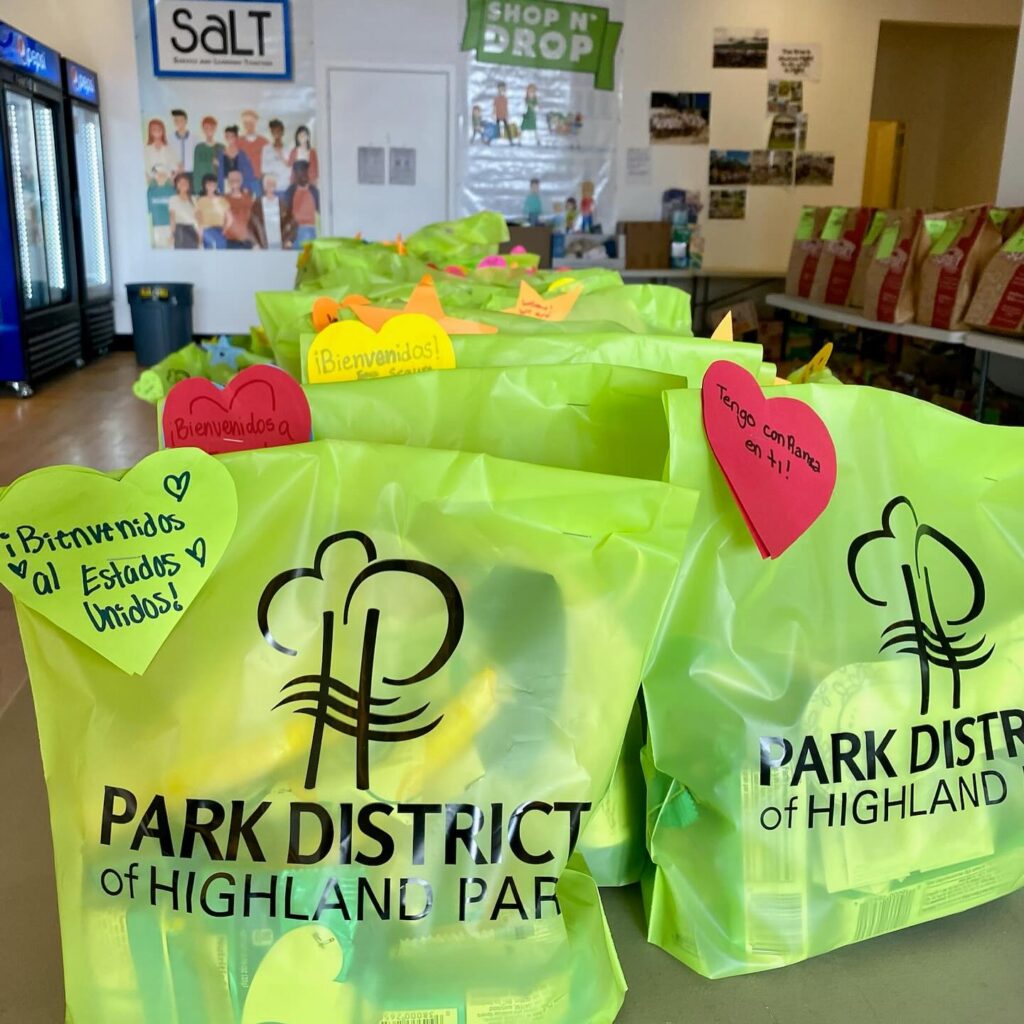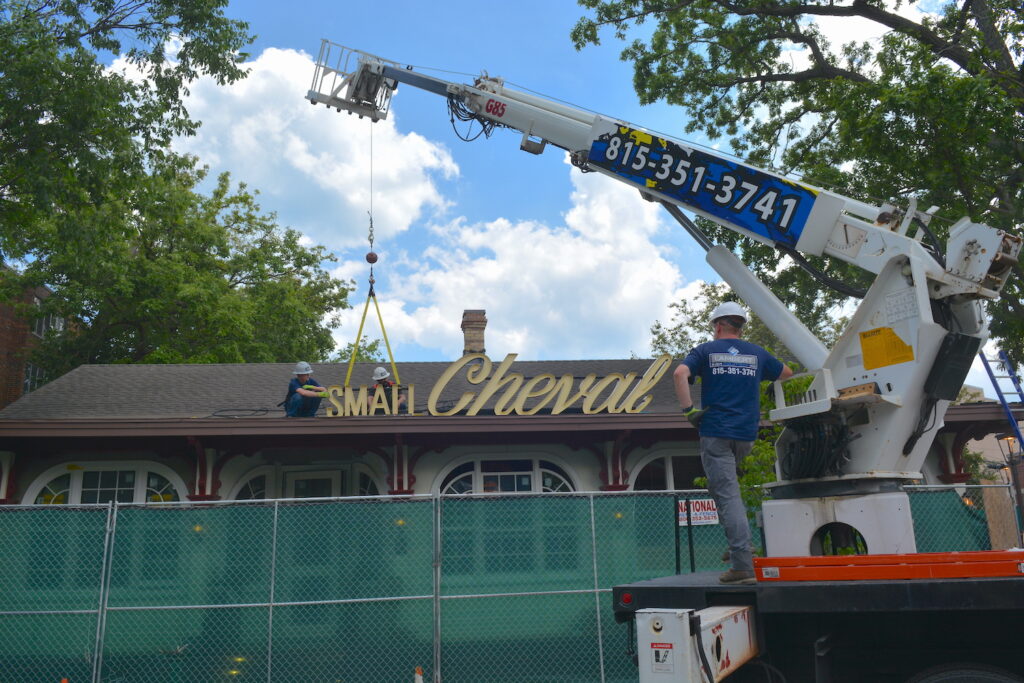
‘Not something we would be able to manage’: More migrant buses are arriving in Wilmette and even more may be on the way
Village officials are considering new policy, while local volunteers continue supportive efforts
Within the past year, suburbs across Chicagoland have installed regulations to curb migrant-carrying buses from Texas arriving unannounced.
Wilmette is an exception. But a recent surge in migrant arrivals is testing the north-suburban community, according to village officials.
More than 50 migrant buses have arrived to the Wilmette Metra station, 722 Green Bay Road, since the new year. Approximately half of those have come in the past three weeks, Village Manager Mike Braiman told The Record.
Village of Wilmette police and local volunteers support the migrants as they make their way to Chicago, and to this point, Braiman said the response has not strained Village resources, but any further increase may do just that.
“Right now, it’s been manageable and hasn’t presented any problems with our ability to serve the community,” Braiman said. “Our concern is with what Chicago is projecting to be further increases.”
According to Braiman, Chicago is reporting about 800 migrants, which would fill about 17 buses, arriving to its processing centers per week, but city officials are estimating significant increases in the coming months — up to 50 percent increase, to 1,200 migrants per week, in May and more than double, up to 2,000 per week, by June.
City of Chicago officials confirmed the expected increase, which reportedly is based on data from 2023 and information from emergency-management officials in El Paso, Texas. A city spokesperson also said Chicago officials are expecting Texas Gov. Greg Abbott to send more migrants leading up the Democratic National Convention from Aug. 19-22 at Chicago’s United Center.
If the surge comes to pass, Braiman said the activity would overextend the village’s police department.
“Those numbers are not something we would be able to manage … and be able to adequately serve the community,” said Braiman, who added that the forecast has sparked renewed consideration in additional regulations on bus arrivals.
“We’re doing our research on it in a thoughtful and methodical way,” he said.
The item could be up for discussion during the Wilmette Village Board on April 23 or May 4, Braiman said.
Local response and support
Since August 2022, on orders from Abbott’s administration, more than 38,000 asylum seekers from the nation’s southern border have been sent to Chicago, according to a dashboard kept by Chicago’s Office of Emergency Management and Communications.
The City of Chicago decided in November 2023 to crack down on bus operators that drop off migrants, creating a surge in unscheduled bus arrivals in suburbs with access to Metra train stations. Many suburbs — including Glencoe, Winnetka and Highland Park in the North Shore — have since passed similar regulations as Chicago, banning unscheduled bus stops.
Wilmette has not, and it has become the primary destination for Chicago-bound migrants, who then ride Metra trains on their way to Chicago’s migrant processing center. Though the buses are usually unscheduled, Wilmette police officers and a department social worker work in concert with local volunteers to support the migrants arriving at the Metra station.
When the buses first began to arrive in Wilmette near the end of 2023, donations to support migrants, such as winter clothing, were kept in the Metra station and monitored by volunteers. The donations then moved outside into a trailer, where about 100 care packages are kept on hand for incoming migrants.
They have gone through a lot to get here. We’re probably the first people they see that actually say welcome.”
Debora Morris, Wilmette volunteer about handing donations to migrants
Wilmette resident Debora Morris has volunteered to support migrants in Wilmette since clothes piled up in the train station. She and Heather Oliver lead the local effort by overseeing the package trailer and organizing donation drives for the hygiene items, snacks and more that go into the packages.
Braiman said typically a bus will arrive in the late afternoon and the arrivals usually coordinate with an inbound train; though, he said, there have been exceptions, like when a bus arrived after 1 a.m. and the passengers had to wait until the first train at 4:49 a.m.
Morris said when a bus arrives, a “rapid response” team of about 10 volunteers communicate to ensure the migrants receive help prior to boarding trains to Chicago.
The buses typically arrive with a driver and one of two handlers, one of whom is responsible for the purchase and distribution of train tickets. The migrants are let off the bus about 10 minutes before a train’s arrival time, and the volunteers hustle to get them a care package and warm clothing before they board.
Morris said the newcomers are often not dressed for Chicago weather, some in flip-flops and shorts. Many have traveled up to 30 hours and without food, and they deserve a proper welcome, she said.
“They have gone through a lot to get here. We’re probably the first people they see that actually say welcome,” Morris said. “They are kind of mistreated along the way here so we just want to help the effort to make them feel welcome.”
Wilmette police escort them on to the train, and when they arrive in Chicago, city volunteers help them reach Chicago’s processing center.
Morris said the recent increase in migrant buses has “made it harder to keep up with it,” but the community has continued to come through with donations, and when Morris and company are in short supply, they lean on SaLT, or Service and Learning Together, a nonprofit out of Highland Park that coordinates the “Take Care” packages migrants receive in Wilmette.
‘Take Care’ Packages

In January, SaLT joined forces with several local organizations for a project to support arriving migrants through “Take Care” packages containing a variety of essentials, from granola bars and water to hats and socks to wipes and diapers.
Donation dropoff sites were set up throughout Highland Park, and then SaLT volunteers collected the items and built the packages.
The operation has since evolved. SaLT encourages donation drives and packaging events. In February, the “Take Care” initiative replaced Wilmette’s previous effort that collected donations in the Metra train station.
Morris said currently hygiene products, including soap, shampoo and toothpaste; water; Chapstick; and small first-aid kits are among the needed items.
Items for new arrivals can be donated at a handful of local dropoff sites: St. John’s Lutheran Church, 1235 Wilmette Ave., between 9 a.m. and 2 p.m. Monday to Friday; and 8-11 a.m. daily at SALT Fitness, 410 Green Bay Road, Kenilworth, Body Science PFT, 642 Green Bay Road, Kenilworth, and North Shore Music, 405 1/2 Linden Ave., Wilmette.
Visit SaLT’s website to find out how to volunteer, what and where to donate, and local donation drives.
The Record is a nonprofit, nonpartisan community newsroom that relies on reader support to fuel its independent local journalism.
Become a member of The Record to fund responsible news coverage for your community.
Already a member? You can make a tax-deductible donation at any time.

Joe Coughlin
Joe Coughlin is a co-founder and the editor in chief of The Record. He leads investigative reporting and reports on anything else needed. Joe has been recognized for his investigative reporting and sports reporting, feature writing and photojournalism. Follow Joe on Twitter @joec2319


